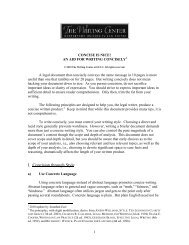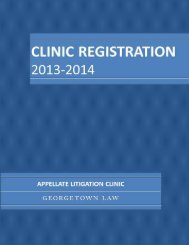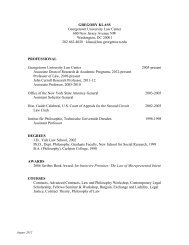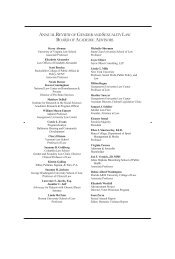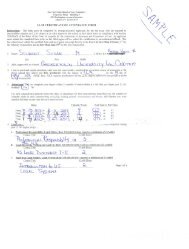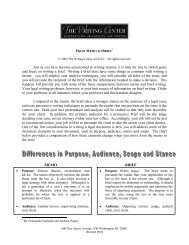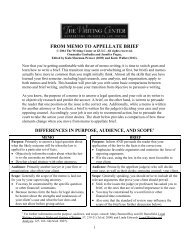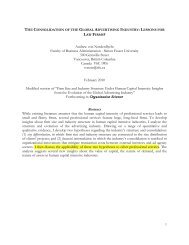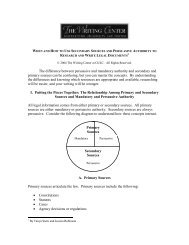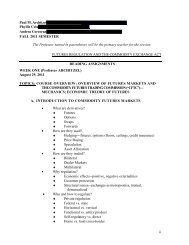Date: April 12, 2013 Topic: The Shrinking ... - Georgetown Law
Date: April 12, 2013 Topic: The Shrinking ... - Georgetown Law
Date: April 12, 2013 Topic: The Shrinking ... - Georgetown Law
You also want an ePaper? Increase the reach of your titles
YUMPU automatically turns print PDFs into web optimized ePapers that Google loves.
Table 1: Representative Excerpts from Interviews<br />
<br />
<strong>The</strong>me<br />
Positive general<br />
view of KMS<br />
Negative general<br />
view of KMS<br />
KMS increases<br />
amount of<br />
workplace<br />
collaboration<br />
KMS reduces<br />
amount of<br />
workplace<br />
collaboration,<br />
with positive<br />
consequences<br />
Uncertain impact<br />
on amount of<br />
workplace<br />
collaboration<br />
KMS reduces<br />
amount of<br />
workplace<br />
collaboration,<br />
Excerpt<br />
Informant: You know, people are curious to see, for such and such partner<br />
or manager, what types of engagements they have worked on. We see lots<br />
of searches by client’s name, or searches by lawyer’s name. …it helps<br />
people find out what everyone is working on and find out who they want to<br />
work with.<br />
Interviewer: So before [the KMS], if I understand you, people knew what<br />
their colleagues were working on?<br />
Informant: Exactly. Everybody knew who was doing what. People<br />
communicated a lot. Because we had to…. So when you gave someone a<br />
job to do, you told him: “Go and see Dupont, I think he’s already worked<br />
on that issue.” Or you said: “I already did something similar last year; look<br />
at client file X.” And it worked very well like that. Because people talked<br />
to one another…. I think that the overall quality of our knowledge sharing<br />
could have been improved through investing in people rather than in<br />
machines.<br />
Interviewer: Do you use it to save time on well-known recurring issues or<br />
do you also use it when you are stuck on new questions, I mean, technical<br />
questions that you have never addressed before?<br />
Informant: It depends. When I am stuck on a technical question, I try to<br />
search the database to see if someone already took a stand on comparable<br />
issues…. If I find someone, I usually call him and ask what he thinks.<br />
Informant: I also use the knowledge base as a consumer, including anything<br />
that is securities law…. I just sold two client projects by the existence of<br />
these [KMS] documents that I would never have sold otherwise.<br />
Interviewer: Did you involve the authors of these documents, in both<br />
projects you sold?<br />
Informant: It was not necessary. At least not at this stage, but it’s all very<br />
recent and I have not finalized my team.<br />
Informant: If I have an idea of the person who worked on it, yeah, I think<br />
I’ll go see the person after watching what she has in the knowledge base.<br />
After hearing about “So and so had to do this or that” well I’ll go see the<br />
person.<br />
Interviewer: Even when you do not know her well?<br />
Informant: Well, no, he must already know that I (pausing), I will have an<br />
easier time knowing what they did and then go to the people if I know<br />
them. If this is someone I have absolutely no idea, there it is more difficult.<br />
Informant (Discussing the outputs from a specific client project): I think<br />
that everything we did is in the knowledge base. And I know it’s already<br />
been used.… When I browse the knowledge base, I realize that some of our<br />
things have been reused.<br />
14



